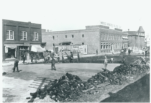National Affairs: Rookie Scheer won’t escape friendly fire
By Medicine Hat News Opinon on November 1, 2017.
Few Parliament Hill insiders were surprised by Jason Kenney’s decisive Alberta leadership victory. The former federal Conservative immigration minister has long been considered in an organizational class of his own. He was the chief-architect of the federal party’s outreach in Canada’s diverse cultural communities. Kenney may have been less popular than his main rival Brian Jean overall, but as former MP Patrick Brown’s own victory in the last Ontario Tory campaign demonstrated, the capacity to bring one’s supporters inside a party tent matters more to the outcome of a leadership vote than one’s standing in the outside world. That can, of course, be less true in a general election. Brown entered the Ontario legislature through the door of a solid Tory riding. Kenney likewise will not face much of a challenge in getting elected to the Alberta legislative assembly. In both cases the test of their wider electoral appeal is still to come. But as opposed to Brown, who as a federal backbencher brought a relatively blank slate to his Ontario bid, Kenney needs no introduction to the national scene. That could be a blessing for his provincial party, but a curse for Stephen Harper’s rookie successor Andrew Scheer. In the past, the presence in Alberta of strong Conservative leaders — liable to overshadow the party’s federal leader nationally — has not been a recipe for success for the conservative movement federally. Think of Peter Lougheed and Joe Clark or Ralph Klein and Preston Manning. Kenney makes both Lougheed and Klein — despite their respective records as staunch defenders of Alberta’s interests — look like pussycats. He just ran on one of the most antagonistic platforms towards Ottawa and some sister provinces outside of a Parti Quebecois leadership campaign. Over the past few months, Kenney turned his guns on Quebec for allegedly biting the equalization hand that feeds it by not supporting the now-defunct Energy East pipeline. For the same reason, British Columbia, whose minority NDP government is against the imminent expansion of the Trans Mountain pipeline, is in his bad books. And he is itching for a fight against Justin Trudeau’s Liberals — on Alberta terms. But what may be a popular scorched-earth, federal-provincial approach in Alberta risks becoming a bridge-burning one for Scheer’s federal Conservatives. If there is one region where Harper’s successor had no great need for provincial reinforcements it is the Prairies in general, and Alberta in particular. Just last week, his federal Conservatives won 77 per cent of the byelection vote in Rona Ambrose’s former Edmonton riding. If Scheer had his way, he would be happy to transfer some of the surplus Alberta Conservative vote bounty to Quebec, where his party finished a distant second in a riding the party had held for a decade under Harper. To pose a credible threat to Justin Trudeau’s re-election in 2019, the Conservatives may not absolutely need a strong showing in Quebec … as long as they recoup some of the ground lost in B.C. in the last election. There, as in Quebec, Kenney’s war of words will not be an asset. Alberta is not the only source of friendly Conservative fire Scheer will have to worry about between now and the next election. In a memo obtained by The Canadian Press last week titled “Napping on NAFTA,” Harper took aim at Canada’s negotiating strategy suggesting, among other things, that its outright rejection of some key American demands was ill-advised. Harper’s remarks were circulated among clients (and some would-be clients) of his consulting firm. As a former public office holder, he is forbidden by law from lobbying the federal government for a period of five years as of the date of his political retirement in 2016. And he does not have much to offer the American lobbies that are natural allies of Canada’s NAFTA battle on Capitol Hill. From a business standpoint, that leaves the pool of constituencies, mostly in the U.S., whose interests are not in line with the trade status quo and for whom the renegotiation of NAFTA is an opportunity to wrestle advantageous concessions from Canada. From Scheer’s perspective, that makes the optics of an alignment between his federal party and Harper on the NAFTA issue potentially poor ones. Between now and the 2019 campaign, it seems Canada’s leader of the official Opposition will have his work cut out for him trying to come across as something more than the puppet of the two strong men of the still-recent Conservative federal era. Chantal Hebert is a national affairs writer for Torstar Syndication Services. 23-22




